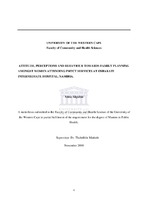| dc.contributor.advisor | Mathole, Thubelihle | |
| dc.contributor.author | Akpabio, Alma | |
| dc.contributor.other | School of Public Health | |
| dc.contributor.other | Faculty of Community and Health Sciences | |
| dc.date.accessioned | 2013-06-14T09:17:43Z | |
| dc.date.available | 2013/03/04 12:10 | |
| dc.date.available | 2013/03/04 | |
| dc.date.available | 2013-06-14T09:17:43Z | |
| dc.date.issued | 2010 | |
| dc.identifier.uri | http://hdl.handle.net/11394/1436 | |
| dc.description | Master of Public Health - MPH | en_US |
| dc.description.abstract | Background: About 22.4 million people were living with HIV/AIDS in 2008 out of which women constitute approximately 57%. Namibia is one of the highly affected countries with a national HIV prevalence of 17.8% among women attending antenatal clinics. Antiretroviral medications have become available in Namibia since 2002 and presently all district hospitals and some health centres provide ARVs to those in need. Namibia is rated as one of the few countries in sub-Sahara Africa with a high coverage of ART, with 80% of those in need of ART receiving the treatment. An increasing trend has been observed whereby HIV+ women on ARV are becoming pregnant. Little is known about the attitude, knowledge and behavior of these women towards family planning and use of contraceptives and what barriers they may be facing in accessing these services.Aim: To determine the factors affecting the utilization of family planning services by HIV+ pregnant women receiving PMTCT services. Methodology: The study was a cross sectional study using both quantitative and qualitative methods to assess the critical elements of knowledge, attitude and perceptions of the study participants towards family planning services. The study also assessed the health system and other factors that impact on the use of contraceptives by HIV+ women. It was conducted in northern Namibia at Oshakati Health centre among randomly selected pregnant HIV+ women attending for PMTCT services.Results: Among the 113 respondents, who participated in the study, 97.3% knew at least one method of family planning but only 53.6% actually used any method of contraception prior to current pregnancy. Among the 46.4% who did not use any contraception, the reasons often cited for non-use were because they wanted a baby (52%), spouse objection (10%), being afraid of the effects (14%) and other reasons such as belief, culture and distance to travel to the health facility. 88% of the respondents indicated a willingness to use contraceptives after current pregnancy and expressed general satisfaction with services at the health centre while asking for more information on family planning services.Conclusion: HIV+ women have high awareness on some contraceptives but use of contraceptives is not as high as many of them have a desire to have children for self esteem and leave a legacy for the future. Knowledge of the risks of pregnancy on HIV+ woman may be limited and there is a need to improve educational intervention in this regard as well as integrate family planning services into all HIV/AIDS services. | en_US |
| dc.language.iso | en | en_US |
| dc.publisher | University of the Western Cape | en_US |
| dc.subject | Contraceptive choices | en_US |
| dc.subject | Family planning | en_US |
| dc.subject | Fertility | en_US |
| dc.subject | HIV/AIDS | en_US |
| dc.subject | PMTCT | en_US |
| dc.subject | Voluntary counselling and testing | en_US |
| dc.title | Attitude, perceptions and behaviour towards family planning amongst women attending PMTCT services at Oshakati Intermediate Hospital, Namibia | en_US |
| dc.type | Thesis | en_US |
| dc.rights.holder | University of the Western Cape | en_US |
| dc.description.country | South Africa | |

